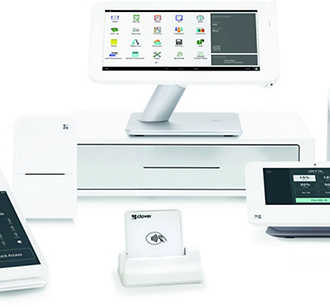
Point-of-sale(POS) systems are vital to running a successful business today. They help you accept and process various payment methods quickly and securely. In fact, 68 percent of businesses rely on POS systems to capture new sales at the checkout counter.
Yet, today’s point-of-sale systems can handle a lot more than payment transactions. They can help with every aspect of your business, including:
- Invoicing
- Inventory
- Accounting
- Reporting
With so many options out there, knowing how to choose a POS system can be difficult.
Fortunately, this guide covers everything you need to know about point-of-sale systems. It’s conveniently broken into easily digestible sections.
If you want to know how to choose a POS system – for both today and tomorrow – be sure to bookmark this free guide for future reference.
What Is a POS System – and Why Do You Need One?
The point of sale is simply where sales are made. Traditionally, this would be a cash register. These days, POS systems are no longer stationary. Instead, they’re mobile, cloud-based networks with comprehensive business functions.
This makes it easy to accept payments while on the go.
Equally important, many of the best POS solutions now accept multiple forms of payment. This is incredibly valuable since, according to a recent study, the number of credit card transactions in the U.S. grew from 37.3 billion in 2016 to 40.8 billion in 2017. And it’s not just plastic, either.
With the emergence of digital wallets, such as Apple PayTM and Android PayTM, mobile payments could represent $503 billion in transactions by 2020.
Here are some other things to consider:
- Consumers and businesses will make 841 billion noncash transactions globally in 2023 – a 46 percent surge from 577 billion in 2018.
- In a recent survey, one in four participants reported a preference for cashless payments.
- The most popular mobile wallets among younger consumers are Apple Pay and store-branded wallets.
A point-of-sale system gives you the ability to accept whatever form of payment your customers prefer. This helps to remove friction and make the buying experience easier and more convenient for customers. The result is higher sales and happier users.
In that sense, having a modern point-of-sale system is mission critical to your business. Here are some additional reasons you should consider investing in the best POS system that you can.
POS Systems Lend Credibility to Your Business
You may be just starting, but you don’t have to operate like a “mom and pop” establishment. Having a POS system that accepts several types of payments establishes credibility with customers as soon as they walk in your store.
POS Systems Make You More Competitive
Technology moves fast. Having the latest tools helps you stay competitive in your industry – even as the payments landscape continues to evolve rapidly.
For example, today’s POS systems give you the ability to accept EMV chip cards, which is significant when you consider that:
- 85 percent of credit cards issued in the U.S. are chip-enabled
- Only about 63 percent of merchants are able to process them
POS Systems Simplify Sales Tracking and Analysis
Modern-day POS systems are more than transaction portals. They can also:
- Analyze sales and give insights into your business
- Help you understand consumer habits and behaviors
- Capture customer data
- Track everything from inventory to employee productivity
POS systems are essential to processing credit and debit cards, but they also play a vital role in improving your operations.
Finding the Right POS System for Your Needs
Now that you know what benefits a point-of-sale system can deliver, you’re ready to choose a solution for your needs. Where do you even start? It helps to first outline your business’s requirements by asking yourself some questions:
- What is the state of your business?
- What are your business struggles?
- What tasks can a POS system can help simplify?
Let’s take a look.
What Is the State of Your Business?
The state of your business plays a huge role in determining the type of POS system you should choose:
- Are you opening a new venture? If so, you want something that is simple, easy to use, and will add a level of efficiency to your business.
- Are you upgrading from an old cash register? Then consider whether the new POS system can help track sales and eliminate discrepancies between cash register reports and matching bank account balances.
- Are you switching from a different POS system? Think about what’s not working for you with your current solution and how a newer system can help resolve those issues.
What Are Your Biggest Struggles?
Every business owner has some pain points – especially new entrepreneurs. But despite these difficulties, many small business owners remain optimistic.
According to the National Small Business Association:
- 84 percent of business owners are very or somewhat confident about the future of their business
- 61 percent believe that there will be growth opportunities in the coming year
A POS system helps merchants achieve a new level of success by addressing some of the problems they’re facing.
Moreover, some POS solutions come with modular add-ons that remove much of the bloat that comes with one-size-fits-all systems. This can be a huge time-saver for overworked business owners.
What Tasks Can a POS System Help Simplify?
Small business owners are known for doing it all. Yet, trying to act as CEO, accountant, marketing manager, and HR director is often too much to handle.
According to author and serial entrepreneur Andrew Griffiths, overwork is the most common cause of burnout for business owners.
With the right POS system, it’s possible to put many tasks on autopilot, such as:
- Accounting: POS solutions integrate directly with accounting systems and can help automate aspects of tax preparation.
- Supervising employees: There are POS systems that can help with everything from creating schedules to making payroll to handling time-off requests.
- Managing inventory: Staying on top of your inventory is a labor-intensive task. Though you can easily use POS technology to track sales, returns, and restocking.
- Competitive analysis: Get solid data to build your business with a point-of-sale system that provides charts, graphs, and heat maps. You can use this information to compare your sales to nearby competitors and understand the health of your company in relation to industry standards.
Things to Consider When Looking for a POS System
Once you’ve examined your business requirements, it’s time to start exploring which POS solutions can meet your needs.
As you begin shopping around for a POS system, here are some things to consider:
Ease of Use
You shouldn’t need an engineering degree to set up and use the POS system. It should be user-friendly.
Your POS system should also be easy enough to use that you don’t need to consult your manual regularly or call for tech support all the time.
Hardware
The size and type of business determines what type of hardware you need:
- If you’re a small retailer, you may need a tablet, card reader, and cash box.
- If you have a larger operation, you may need terminals, receipt printers, barcode scanners, or more.
Software
POS systems start with the software, so examine each option’s capabilities and costs to make sure they’re the right fit for your business.
Integration
Does the point-of-sale system integrate with tools, apps, and software that you’re already using?
Many solutions have native software that locks you into their tools. It’s best to explore POS systems that integrate seamlessly with third-party vendors.
Automation
Does the system automate processes and reduce manual inputs? For example, a good POS solution should be able to use data from your logistics and supply chain to update inventory and order information.
PCI Compliance
Payment security is also essential. This is especially true for small businesses, since they’re the victims in nearly 43 percent of cyberattacks.
Any POS system you consider should be compliant with data security standards established by the Payment Card Industry (PCI). In addition, you want a solution that can further safeguard users’ payment data with:
- End-to-end encryption
- Data tokenization
Support
No matter how technically savvy you are, it’s good to have access to customer support. Whether you run into issues or need help setting up the system, look for a POS solution that provides 24/7 support via:
- Live chat
- Phone
Cost
Obviously, you need to consider the cost of the POS system (including the hardware and software). The type and number of terminals you purchase should align with your needs.
- Some companies, like Clover, sell all-in-one payment processing systems.
- Others sell pre-configured packages or kits. You can add a la carte items such printers, cash drawers, stands, and readers. Some add-ons may have to be combined with an iPad or Android device.
Also consider the operating costs, such as card processing fees. Typically, these are a small percentage of the total sale amount, plus an additional, nominal flat fee. If a card is manually entered (versus swiped or dipped), expect the processing fee to be slightly higher.
Opt for a POS provider that gives you the ability to choose your credit card processor. Otherwise, you could be stuck paying higher fees to whomever it chooses.
Features
POS systems boast many features. In addition to accepting payments, you might find solutions that can handle:
- Inventory tracking
- Customer management
- Invoicing and billing
- Refunds and returns
- Employee scheduling
- Data analytics
Make sure the POS system you choose has all the features your business needs.
The Company
It’s not all about the product. When you purchase a POS system, you’re also doing business with the company. Here are some question to ask each prospective POS provider:
- Is the company financially viable? You don’t want a company that is struggling and may be out of business within a year.
- Is POS its primary business? A company that focuses primarily on POS tends to have more expertise and is more committed to its products.
- What experience does it have serving your industry? Consider whether the company is used to helping businesses like yours. If not, this could be a red flag.
- Is the company a provider or reseller? Providers tend to have a better relationship with business owners and provide superior merchant support, quality, and expertise than resellers.
- Does the company have positive or negative reviews? Research what others are saying about the company, its service, and its products.
Picking the Best POS System for Your Business
Now that you’ve considered all the core elements of a POS system, it’s time to decide what solution is best for you.
The type of business you have (as well as its size and operations) can help you make this determination.
Type of Business Determines Type of POS System
What kind of POS system to choose ultimately depends on the nature of your business. For example:
- A brick-and-mortar coffee shop is run differently than a mobile food truck
- A clothing boutique has different needs than a construction contractor
You’ll probably want a traditional set-up with a full-service POS if you have a retail store, salon, dry cleaner, or quick-serve restaurant. Consider countertop POS systems, which are available in various sizes and take less space than traditional cash registers.
A single terminal is sufficient for most stores. If you have a larger space or deal with variable amounts of traffic, having more than one terminal can help you handle the extra load.
If you run a food truck, pay-at-table restaurant, or festival booth, a mobile POS might be the best choice for you. These portable systems give you the flexibility to process payments right at the point of sale instead of making customers wait in line.
Faster service means happier customers (and more sales per hour).
What’s Your Budget?
As mentioned earlier, consider cost when determining the right POS system for your business. Cloud-based POS solutions usually have tiered pricing models, where the cost depends on the number of stores, customers, products, terminals, and features.
Examine each tier to see which one delivers the highest possible return on investment. And don’t forget to take into account the processing fees mentioned before.
Can You Scale Your Business Easily
Ideally, your business won’t remain flat. It will grow. Make sure you consider your needs one, five, and 10 years from now.
Think of how fast you expect to grow and let that help determine your long-term POS needs. For example:
- Can you easily add features to the POS system?
- What’s involved with upgrading and what’s the cost?
- Will you need to switch POS systems eventually?
As a business owner, you need to constantly be thinking ahead. Let questions like these aid you in your decision making process.
Get References from Other Businesses
Once you’ve narrowed down your choices, find out what other businesses are using those same solutions.
You can ask the company for references or ask around the local business community about the POS technology they use.
When looking for references, make sure they are using the software version you are evaluating.
Get a Trial or Demo of the POS System
Most POS vendors offer demos or free trials so you can try the software. Doing so allows you to test features, explore benefits, and see how the overall system operates.
Make notes of any problems you have, plus what aspects you do and don’t like. Be sure to share these with the provider so it has a chance to address your concerns.
Taking these steps will help ensure you find the right POS for your business.
Optimizing Your POS System for Maximum Business Growth
Once you decide on a POS system, look for ways in which you can optimize the platform to improve your business. For example, many solutions include extra features, add-ons, and apps that can save you time or increase your productivity.
You may want to keep it simple in the beginning. Once you’re comfortable, explore all the system has to offer, including:
Business Insights
Data analytics are a dynamic part of modern POS systems. While this used to be the exclusive realm of only medium to large companies, it’s now possible for small business owners like you to take advantage of these insights.
Explore the data analytics the POS offers.
Ideally, your system should create detailed sales reports, complete with charts and graphs. It also should have an easy-to-comprehend dashboard that provides sales, cash, and inventory data in real time.
With these powerful insights, you can:
- Uncover trends: Data can unlock meaningful trends in sales, such as the who, what, when, and where of every purchase.
- Gain a competitive edge: Keep track of competitors’ performance and analyze how your sales numbers compare.
- Expand your footprint: Get hard data on where and when to expand your business with new locations, equipment, or personnel.
Discover Apps and Add-ons
Just as there are many smartphone apps that make your life easier, there are apps for your POS system that can help you run your business. Check to see what apps and add-ons your provider offers.
For example, Clover has a large App Market consisting of free and paid apps. In addition to apps developed in-house, Clover’s marketplace features third-party apps that integrate with the POS.
As you use the system, ask your employees for feedback and whether they see ways to further improve the overall experience for themselves or for your customers.
Also, don’t let the relationship with your provider end at the point of purchase. Stay in touch about new products, features, and ways to maximize your business with your new POS system.
Let Us Help You Find the Right POS System for You
A POS system is one of the most important investments you can make. Be sure to consider all aspects of your business before committing to any single solution.
If you need help, we can tailor a POS solution to meet your specific needs.
In addition to PCI-compliant payment processing, our POS systems deliver valuable:
- Customer insights
- Business intelligence
- Essential sales data
We help you get paid, sell more, and run your business better.
Find out how you can get started today.





